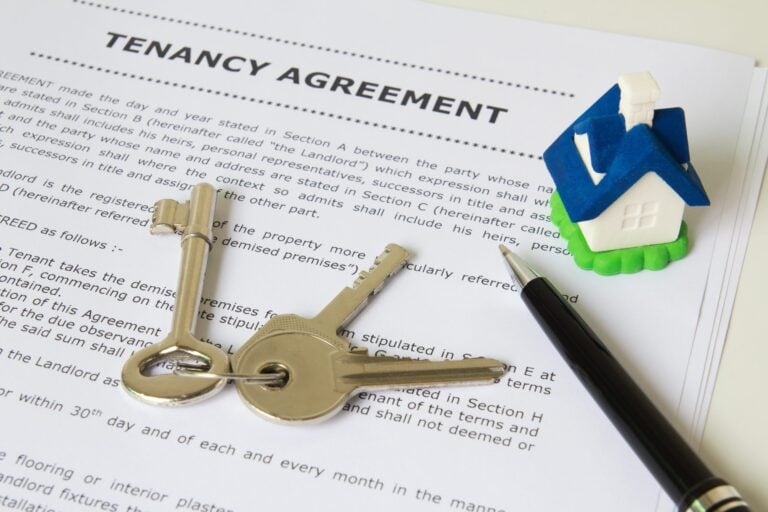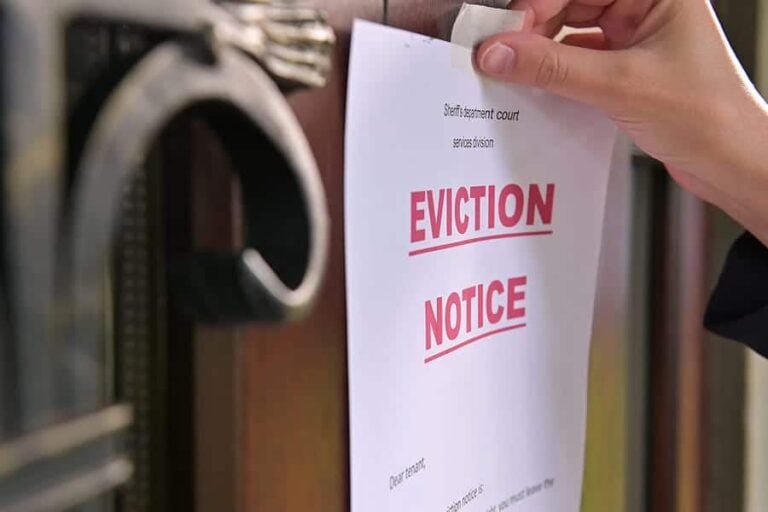After living through the chaos of the past few years, we can all agree that sometimes, life has a way of coming at us fast and hard. Suddenly, your career pivots, a previously stable relationship crumbles apart, or your finances can get upended. For one reason or another, the need to move comes upon you quickly. Since you were never really a huge fan of your landlord, you make the impromptu decision to go ahead and skip out on the remaining months of your lease.
No harm, no foul, right?
In a similar scenario, you opt to complete out the lease but your landlord later demands payment for damages that supposedly exceed your security deposit.
What happens then? Or, what happens if you’re simply behind on your rent and your landlord decides to record your unpaid rental debt on your credit report?
In every one of these situations, apartment debt gets created. Like many other types of delinquent debts, apartment debt needs to get addressed as soon as possible before it wrecks further havoc on your finances. Learn more about apartment debt and how to pay off your apartment debt for good below.
Apartment Debt: What is it and What is Apartment Debt Collection?
As explained above, apartment debt gets created when you’ve entered into a rental agreement with a landlord and you fail to uphold your end of the deal. Whether you miss out on some rent payments, decide to move out before your lease ends, or wind up causing a lot of damage to the unit, you wind up owing money to your landlord, and they have a legal claim to seek out that money.
Tips for Keeping Up-to-Date Records
The best way to avoid having apartment debt is to keep up to date financial records and stay consistent with paying your bills on time. That way, if you ever wonder how to find out if you owe apartment money, you can review your own records first. If you’re unsure about your own records, then it’s always possible to check in with your landlord, review your bank account transactions, or review your pay stubs from past rent payments. Keeping solid records will also be very useful if you ever need to seek out rent debt help. You can use your past payment history as proof of your past stability and efforts.
To ensure that you keep up-to-date records, consider purchasing a special file or folder that you dedicate to your apartment. In the file, keep a copy of your rental agreement. Keep a record of the state of the home when you first moved in (any existing damages, repair, etc.), and make sure to document the rent payments you make, too. If possible, then do your best to remember to document your payments each month and save the proof in your file. As you get used to doing this, it will eventually become a habit.
Should I Pay Off an Old Apartment Debt?
We know what you’re thinking – do I really need to pay off that old debt, though? Won’t it just go away eventually?
The answer to that question depends on where you live. In some states, debts don’t ever expire or disappear. In other states, apartment debt does have a statute of limitations. Either way, that debt is sure to cause a lot of problems for you if you opt to ignore it for that long.
If you don’t want to experience the negative impacts of having a debt hanging over your head for years, then it might be in your best interests to pay it off. Even more importantly, if you’re still residing in the apartment, then you could face eviction proceedings if you ignore your debt. This makes paying it even more important. Learn more about what negative impacts an unpaid apartment debt can have on your finances below.
Is Apartment Debt on Credit Reports?
Yes. Old apartment debt that you ignore could reappear on your credit report if your landlord decides to send it to a debt collector or inform the credit bureaus about your delinquency. If this happens, your credit score will inevitably decrease. Even worse, the negative remark could prevent you from renting a new apartment if your new potential landlord sees the previous delinquency on your credit report.
The good news, though, is that all of this won’t happen without your knowledge. According to the Fair Debt Collection Practices Act, landlords must put any debt notification in writing and give you at least 30 days to dispute it.
The Importance of Monitoring Your Credit Report for Apartment Collection Accounts
Since apartment debt can get sent to credit agencies and reported on your credit score, it’s a good idea to start monitoring your credit report if you know you’re falling behind on your apartment payments. In fact, it’s always a good idea to monitor your credit score. Doing so can help you ensure that your credit report is accurate and that you aren’t falling victim to any financial scams like identity theft.
You can monitor your credit report yourself by checking your credit score regularly. You might also want to consider using a credit score service that can help you stay on top of your score. Some agencies will send you regular alerts regarding new information being reported on your score.
If you ever notice an error or that apartment debt gets reported inaccurately, then you can dispute the information in your report. The best way to remove a delinquent balance, though, is to handle the situation one-on-one with your landlord and have them report the payment to the credit agencies.
Can My Former Landlord Sue Me?
Yes. Your former landlord can seek out a civil lawsuit against you if you fail to pay your debts. If they take this course of action, then you’ll be served with a summons and complaint. You must respond to this lawsuit. It’s strongly advised that you do not ignore these summons or fail to show up in court. If you do, then you might find yourself in an even worse position. Your landlord could be granted authority to garnish your wages or even take funds from your bank account. The good news is that you can likely avoid those types of judgements by showing up to represent yourself in court.
Steps to Take When Disputing Apartment Collections
If a debt did go to a collection agency or get reported as delinquent to the credit agencies incorrectly, then you’ll want to learn more about how to dispute apartment collections.
First, check out your credit report to get a better idea of what the debt is, where it came from, and whether or not it’s legitimate. If you know it isn’t valid, then request a debt validation letter from the person who reported the delinquency. Once you get more information, you can also write a dispute letter to the debt collector.
Questions to Ask Collection Agencies Before Making a Payment
If you discover that the debt is valid and you want to make a payment, then you need to know what to ask for when paying off a collection. Sometimes, one simple question could be the difference between paying the debt in full and having your request to remove apartment collection from your credit report approved. Here are a few things to ask:
- How long has the debt been in collections?
- Can they verify the debt?
- How was the debt calculated?
- Is the debt collector certified, bonded, and licensed to operate in all 50 states?
- Will the collector report the payments to the credit agencies?
- Can the agency send you documentation outlining your payment plan agreement?
How to Negotiate Rent Debt with Landlords
If it’s possible, then you’ll want to negotiate your rent debt with your landlord before it ever gets reported to a collection agency. The best way to go about doing so is to talk to your landlord one-on-one. Explain your situation, and offer a new payment arrangement. Your landlord, in most cases, has a huge incentive to work with you so that they don’t have to spend a lot of money going through an eviction, cleaning up the property, and attempting to find new tenants.
How to Pay Off Apartment Debt
Clearly, it’s usually always in your best interests to pay off an old apartment debt, but figuring out how to pay off eviction debt is another story altogether. After all, you likely got into debt in the first place because you didn’t have the money to pay off what was owed. If something has changed, however, and you have the money, then your best option is to simply pay off your debt in full in one lump sum.
When that’s not an option, you’ll need to consider a settlement offer arrangement with your old landlord.
Considering an Apartment Debt Settlement Offer
If you owe money to an old landlord, then it makes sense to consider discussing an apartment debt settlement offer with them. An apartment debt settlement offer is beneficial for both parties. Your landlord won’t have to continue investing money, time, and effort into tracking you down and seeking out their rightful money, while you’ll be able to stop any ongoing collection efforts and negative impacts on your credit score.
A settlement offer is essentially a payment plan with a negotiated lower total balance than was previously owed. If you plan on agreeing to an apartment debt settlement offer with a landlord, then make sure to get the agreement in writing.
Additional resources:
- How to Negotiate a Settlement With Your Landlord
- How to Prevent Eviction: 5 Steps on How to Not Get Evicted
- What You Need To Know About The New Eviction Ban
How to Pay Off Old Apartment Debt For Good
Are you ready to finally get rid of that old apartment debt once and for all? If so, then you should follow the tips outlined in this article. If all goes well, then you’ll be able to regain control of your finances, get back in good standing with your former landlord and the credit bureaus, and move on with your life.
Of course, if you need help negotiating with your landlord or coming up with favorable settlement arrangements, then our agents can help. Contact United Debt Settlement now to learn more about how we can help. Call us at 888-574-5454 or fill out our online contact form now to get started.

Steven Brachman is the lead content provider for UnitedSettlement.com. A graduate of the University of Michigan with a B.A. in Economics, Steven spent several years as a registered representative in the securities industry before moving on to equity research and trading. He is also an experienced test-prep professional and admissions consultant to aspiring graduate business school students. In his spare time, Steven enjoys writing, reading, travel, music and fantasy sports.








